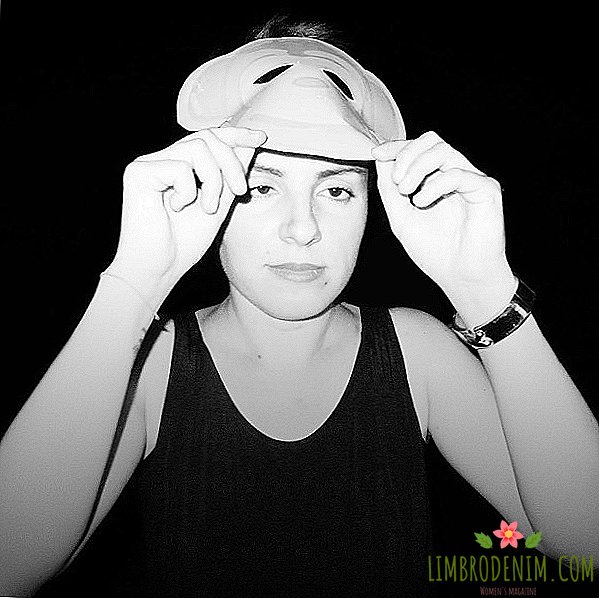I have squint: How one feature changes the view of the world
My name is Maria Chertkova, I am 35 years old, and I'm a curator of sociocultural projects. All my adult life I have known myself with squint, it has been with me since birth. But my parents did not raise me as special, so I didn’t feel that way. Since childhood, I wore glasses, went to the Research Institute of Eye Diseases. Helmholtz. Then the severity was more: his eyes looked completely apart. It is believed that strabismus is not corrected until the age of 18, since in childhood and adolescence the muscles are very plastic - if at this time you have an operation, they will stretch. So, there was no urgent task to get rid of him: I wore glasses and did exercises.

In school time, children quickly begin to notice features. I then went in glasses and I was teased by my beloved, "Goggles, in the pope a ball, I went to a football game." Not to say that it hurt. If I had been shouted: "Masha is a scythe hare!", I would not be offended. I walked with my eyes stuck in turns, no one scoffed. Interestingly, there has never been a direct reference to the fact that I squint: the glasses worried more, scoffed only because of them. I did not suffer from strabismus and I am glad of it: I understand that it could have been different. In adolescence, I was much more worried about my nose. And when the question arose of whether to perform the operation or not, I refused - I liked to wear glasses. Later, the fear of anesthesia stopped me.
I have good eyesight - it’s good that the squint does not affect him. But some things are not available to me. For example, I can not watch a movie in 3D - everything is twofold, and I see a projection of the original image. Therefore, when I put on stereoscopic glasses, I do not see the whole picture, but its separate pieces intended for the right and left eyes. In everyday life, everything is also a bit double.
I noticed that if “something is wrong” with you, others are sure that you want to fix it.
Sometimes people ask: "Oh, and when will you have an operation?" I noticed that if “something is wrong” with you, others are sure that you want to fix it. To squint the same attitude. At the same time, when I say that I will do the operation, the opposite effect is obtained. They object to me: "What are you doing, this is a trick. And so you will be like everyone else!" It is strange if you are only interested because of squint. This reaction does not offend, but it shows that now you must be "not so." So you find yourself trapped in its own particularity. Therefore, I don’t like it when they insist on preserving physical features, when they see your shell instead of you, identify and label just because you are different.
After a while I looked at myself from the side and realized that my character and my squint is the unity of form and content. I strive to destroy stereotypes, to leave the comfort zone and not be afraid of unusual things. When I draw, I intentionally add asymmetry, because at the moment when everything complies with the rules, form and content die. Squint is close to my philosophy. I have such a character that I often provoke, and in this case, squint works for me. It happens that a person nervously, with anguish asks: "I don’t understand where you look at ?!" That sounds like a challenge. And, as a rule, I answer: "Already three minutes on you." The interlocutor begins to be embarrassed - but I don’t see myself, as a matter of fact, I don’t care.

The reaction to my squint convinces once again that people are static in their form, they want the world to stop, to be understandable and familiar. Children react differently: somehow, in a subway, a five-year-old girl first looked at me for a long time, and then began to portray me. She kept her eyes to her nose, funny rolled them up. When she noticed that I was smiling, she began to grimace even more. It was funny - because we do not take offense at the comedian. But if an adult had done so, I would have thought he was a fool.
We are born with different physical characteristics and are dependent on what we are used to. People constantly want unification. Of course, everyone notices the differences, and the main thing here is to learn how to react correctly, and not to cultivate a painful perception. Because it can be argued for a long time that physical features do not affect our reaction, but more often it is not. The surrounding people, out of fear, try them on themselves and change their attitude.
The reaction to my squint convinces once again that people want the world to stand still, be clear and familiar
Now more than ever, they began to talk about the difference. At some point, exaggerating the situation has become a fetish: "It's good that you are not perfect, because we have already passed the ideality and caste." Those who think broader understand that at the moment we are at the stage "we have noticed" others "and will work with them." But there is no further awareness yet. Apparently, through these poles we will come to an acceptance: we will stop dwelling on physical features and, when we talk with a person, we will stop focusing on the fact that he has a squint or, for example, a limb has been amputated. We will not use this as a flag and select a person according to this principle. However, there is a lack of development from the other side. A person with a physical feature often experiences aggression because he feels a lack of understanding from others. We must learn to accept people who have something that you don’t have.
To "pull" the world and constantly notice all imperfections or, on the contrary, not to provoke and accept - this is the personal choice of each person. I made mine: at some point I had more tolerance, I began to respond more calmly. I understand that now I could have an operation. After, most likely, nothing will change in my head. However, I am curious if I would stop being interesting if I change my appearance.
Photo: Natalia Gafina





